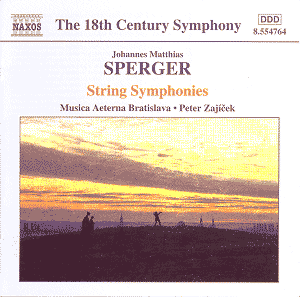Johannes Matthias SPERGER
(1750-1812)
String Symphonies in C [19.09], F [26.16]
and B flat major
[23.16]
 Musica Aeterna
Bratislava/Peter Zajicek
Musica Aeterna
Bratislava/Peter Zajicek
rec. 22-23. 1. 92, Classical Manor House, Dolma Krapa,
Bratislava.
 Naxos 8.554764
[68.41]
Naxos 8.554764
[68.41]
Crotchet AmazonUK
AmazonUS

Sperger's an interesting impostor. These recordings come originally from
Marco Polo, and his music was recorded on original or period instruments
in January 1992. The sound is full and at a distinctly lower pitch than some
of the Naxos 18th century stable, or anywhere else. He sounds, with his agogic
hesitations, flurries and starts, like a typical mid-period classical composer.
He moves on from composers like Beck and Gossec with their still 'galant'
grandeur and doesn't plumb Pleyel's pastiche depths in his minor-keyed
symphonies. But he has learnt from Haydn. Unfailingly tuneful and elegant,
with a series of mild stops and starts, he has an individual flavour. He
even wrote a Grande Sinfonie in F major to mirror Haydn's f minor
Farewell Symphony, only this time starting with two violins, and building
up.
Born in Feldsberg, he became a double-bass player and composer, studying
with Pichlberger who so often played under Mozart's direction; and with
Beethoven's teacher Albrechtsberger. He was in Vienna around 1777-78, became
a chamber musician in the household of Cardinal Primate of Hungary, Prince
Joseph Von Batthyanyi in Pressburg, where he stayed until 1783. The Emperor's
politics made this position tenuous. Still, this is where much of his prolific
output was composed. He entered the service of another patron who died in
1786, Count Ladislav Erdody at Fidsich. He was finally taken in by the Grand
Duke Friedrich Franz 1 of Mecklensberg-Schwerein in 1788, where he stayed
until he died in 1812. There he had a string band of 21 players. Mozart's
Requiem was played for his own requiem, which says something for the
regard in which he was held.
He wrote 45 symphonies. The three here survive in numerous forms, with horns
and other parts, from the period when Sperger was looking for promotion or
escape during the early part of his career. The first of these is relatively
straightforward, but not all smoothness and enlightenment. The second in
F has a rather imposing introduction and turbulent central development section.
The finale of the last in B flat develops with flecks of drama in its repeated
exposition, tightening the classical screws.
All told, highly attractive, if not plumbing the greatest of Vanhal's or
Pleyel's or perhaps Beck's talents. He sounds in any case of a different
generation to the latter, a composer of small swells and agogic hesitations,
though not to Haydn's extent. Something of Vanhal's fizz had touched him
too, as the finales testify.
In sum, one of the better releases, and played by another band Naxos have
either ignored or allowed to disband. Certainly Musica Aeterna haven't quite
lived up to their name. This is a great pity. At this price, it would be
an utter triumph to have such period performances passim or frequent. As
it is, Chandos's sleekness under Bamert rivals the occasional rawness of
some Naxos bands, except of course the British ones under Nicholas Ward.
This playing provides an antidote, and begs a few questions.
Simon Jenner

